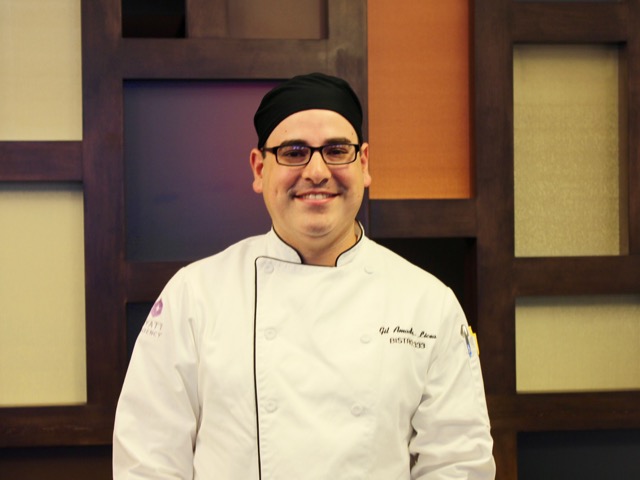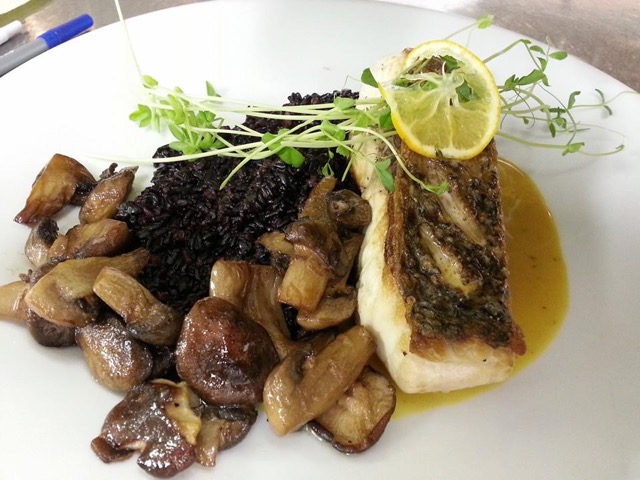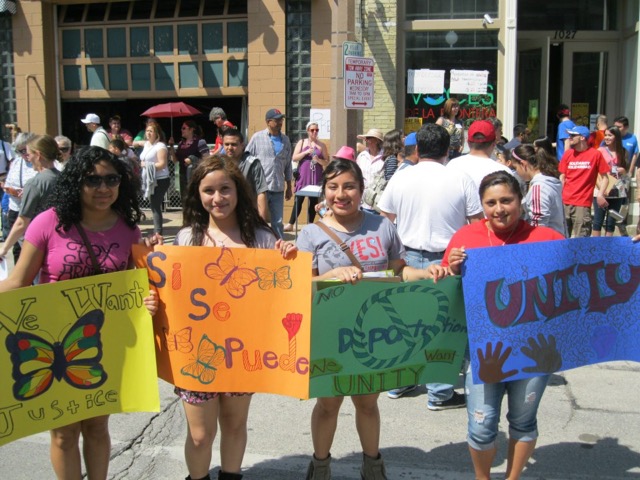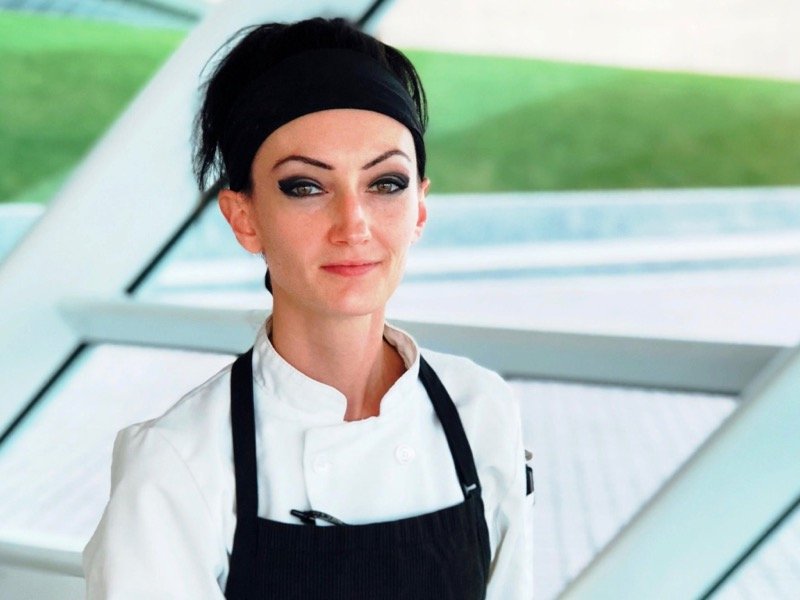In many ways, the morning of Thursday, July 14 transpired in much the same manner as any other. Chef Gil Amador and his wife Jennifer observed their normal routine, preparing themselves and their daughter Sam for the day ahead.
But the normal morning schedule was preceded by a sleepless night for Amador, who was filled with excitement at the prospect of what lay ahead. For he knew that later that morning he would be standing in the U.S. Federal Courthouse taking an oath that – after a long four-year journey – would make him a citizen of the United States.
"For the first time ever, I wore a mismatched pair of socks," he notes with a chuckle. "They were a gift from a friend. One side was stripes and the other was stars. And when I put them on I thought ‘Let’s just have fun today.’"
Amador, who earns his living as a sous chef at the Hyatt Regency Milwaukee Downtown, says the day brought mixed emotions.

"For years after I moved to the U.S., my relatives ... distanced themselves in a way," he says. "There was a sort of shame because when you come to the U.S. you lose all of your privileges as a person. You’re moving to a place where people treat you as a second-class person. So as I was getting ready, all of that came into my head. It’s hard. In a way I’m leaving everything behind."
But Amador patiently waited in line, along with 48 other applicants from 26 different countries, to swear his allegiance to the United States of America.
"Those people, they describe for you the future of Milwaukee," he says, "... men, women, speaking all different languages. It was such an experience to be part of this group of new Americans. It’s as if we were all there to say: ‘We’re not going to change our culture. Our accents are not going away. But you cannot get rid of us. We are a part of your community. And you can accept that, or you can isolate yourself from reality.’"
During the ceremony, which was conducted for the entire group, Amador says they were first asked to renounce their citizenship in their former countries.
"She made it very clear that it didn’t mean you had to lose your traditions or customs," he explains. "You are free to be yourself. And she asked if it was OK, if we had second thoughts or if we were ready to take the oath. After we took the first oath, she asked if we were willing to defend the constitution and the country, if necessary."
The entire group stood, says Amador. And all at once he was imbued with a new rush of emotion.
"I felt very light at the moment," he says. "Everything that had happened to me in ten years hit me at once. I’m still trying to process all of those feelings … even now, I still can’t believe it. For years, I had to carry at all times a green card. But it’s always in the back of your head that you’re not a citizen. So it’s a lot of new feelings."
Coming to Milwaukee
Amador’s journey began in 2006. He was 21 years old, and he’d made the tough decision to leave Mazatlan, Mexico, with the hope of making a better life for both himself and his family. When he landed in Milwaukee, a grey fog hovered above the snow-covered landscape. He shivered, grasping the $50 in his wallet and preparing himself for what lay ahead.
"I wanted to be a chef, and I wanted to see myself prosper. I couldn’t do that at home," he says as we sit in a coffee shop in Walker’s Point. "In Mexico, there’s a big tradition in hospitality and culinary. And you do it because you love food and for pride. But there wasn’t the respect for the profession."
There also, he notes, wasn’t particular respect for the indigenous cuisines.
"Mexico is a place where we’re surrounded by malinchismo," Amidor explains. "We’re taught to follow the white, follow the foreigners who have been a part of the conquest of our country. In many ways, we’d rather have someone from outside tell us how and what to cook."
Amador, who had been cooking since he was 16, already bore a great deal of knowledge about the culinary world. He knew how to pick out fresh seafood at the market, as well as how to cook it. He also had experience in whole-animal butchery.
 Shrimp at the Las Changueras in Mazatlán.
Shrimp at the Las Changueras in Mazatlán.
"But it was hard for me to sell those skills to my employers in the U.S.," he says. "In Mexico, you start as a prep cook, and you work your way up. Here, I had to start over."
Amador hadn’t yet mastered English, which made communication challenging, even in the kitchen. Fortunately, he was able to garner assistance from other Mexican cooks, who showed him the ropes and helped him to forge his way. He worked in a variety of kitchens, including the Weissgerber restaurants and at Meritage.
And as time went by, he landed a job in the kitchen at Bosley on Brady, an East Side restaurant that specialized in seafood. It was, he says, finally a place where he felt like he could really contribute.
 Striped bass with passion fruit beurre blanc and black forbidden rice.
Striped bass with passion fruit beurre blanc and black forbidden rice.
"Michele [Green] saw me as a person before she saw me as an immigrant," he says. "She gave me a chance. And I would not be a chef now if it weren’t for her."
But even after settling into his new job, Amador says he still felt like a stranger in a strange land.
"I didn’t have close friends," he says. "To most people, I was the Mexican friend. We like you, you work hard, but stay over there … that’s how they treated me. Even my coworkers made separations. They would play Scrabble, but they would never invite me to play. And they didn’t know I would have beat them … I am very good at Scrabble …"
Switching gears
By 2010, Amador says he had had enough.
"Everything was falling apart," he says. "I was working two shifts to make a living, and I felt like my career wasn’t going anywhere. I was wrong about that, but it seemed like no matter how hard I worked, I didn’t have any path. I didn’t have friends. I didn’t see any open doors. I just felt stuck and unwelcome."
The fact that mid-term elections were right around the corner didn’t help.
"Even people who I had a lot of respect for seemed to become very anti-immigrant," he recalls. "And no one asks you, are you a citizen? They just saw me and how I talked."
So he bought a ticket to go back home to Mexico. He gave his two weeks’ notice at work and packed his belongings. And despite a feeling of nagging regret, he prepared himself to head home.
"It’s not what I wanted, in a way," he says. "In a way, I felt free here. I had the opportunity to say what I wanted to say. And you can’t do that in Mexico. The fact that you even have a right to be openly racist, and I can respond to you without getting in trouble, that can’t happen where I’m from."
 Milwaukee Unity March.
Milwaukee Unity March.
But before he left, friends invited him to a Thanksgiving party. And while he was there, he found himself falling … for a girl named Jennifer.
"I didn’t know it," he says, "but my friends set me up. I hadn’t dated anyone in a long time. But she was – in a scary way – very similar. She was being herself, and I was being myself. And I felt immediately … like a dying flower coming back to life. I asked her out. And then I cancelled my flight and my plans."
The two started dating, and Amador got his job at Bosley back. And somehow, things began to look up.
"Jennifer was the first person who understood – or accepted – who I was without any strings attached," says Amador. "It’s the first time I felt a connection with someone who wanted to know more about me. And I wanted to know more about her. And it was magical. Without me asking, everything started to be a new normal."
As time moved on, Amador proved himself in the kitchen. And Green promoted him – first to sous chef and then, 10 months later, to executive chef, a position he held until moving on to the Hyatt in 2014.
"I also became more active in the community," he says. "I started volunteering and I started expressing my political opinions. I felt like this was my home, and I wanted to show people how immigrants, including me, were contributing."
In 2012, he and Jennifer were married.
 (PHOTO: Meg Isaacs Photography)
(PHOTO: Meg Isaacs Photography)
That same year, Amador also began the process of applying for U.S. citizenship.
"Each path to citizenship is completely different. It depends where you come from and how much money you have," says Amador. "And the first obstacle is always money."
Amador estimates that, over the course of four years, he spent close to $10,000 on expenses related to the citizenship process.
"In order to even apply for permanent residence, you have to pass medical tests and get all of your vaccinations," he says. "And somehow, because it’s my story – which is always tragic and dramatic – they found a heart murmur. And that halted the process. I had to go through all sorts of tests before they determined that I was fine and wasn’t going to die. And then they couldn’t verify my vaccinations. So I ended up having six or seven shots all in one day. That was kind of dangerous, but I did it."
Mexicans in the kitchen
"Those ten years were just first steps to create my own path in Milwaukee," says Amador when asked about the future. "I feel that now I have a true opportunity to grow exponentially, as a person, as a chef. And really enjoy my city fully."
He says he’d also like to begin tackling some of the inequities that exist in restaurant kitchens across the city.
"Kitchens are like a microcosm of our community," he says. "It’s a place that’s just as racist as the outside, in many cases. You have to work harder as an immigrant in a kitchen to prove that you are talented. You have to work overtime. And you take less cigarette breaks. And you have to accept that you make significantly less money than other people on the line. In the end, we just want to be acknowledged. We have people from all over the world who have skills and experiences to share and we’re just begging for people to take interest, to acknowledge us."
 NY au poivre with peppercorn cognac sauce and prosciutto wrapped scallops at Bosley.
NY au poivre with peppercorn cognac sauce and prosciutto wrapped scallops at Bosley.
Amador says that in a city where talented kitchen help is often difficult to find, there is a wealth of knowledge – along with a keen work ethic – that could be tapped in the Mexican community.
"When people hire Mexican cooks, they should really consider how to take advantage of their culinary backgrounds and experiences ... to learn from them," he says. "Don’t assume that we learned how to be chefs here. Many of us came [to this country] with knowledge. We all have different experiences and they can add to your business. When you do that, you are empowering a cook but you are also gaining knowledge."
And he says it’s often as simple as acknowledging the contributions of everyone in the kitchen.
"It’s never the chef’s magical brain alone that creates the dishes on the menu; the ideas come from experiences and from coworkers," he says. "Be brave enough to give credit to those people. Be brave enough to say: This is who we are as a team."
Amador says he still has a ways to go before he can fulfill his ultimate dream to own his own restaurant. But in the meantime, he’s working on ways to begin to tell his story through food.
"I’ve always been a critic of presenting an ethnic dish without knowing or experiencing that culture. Because when you present it, it’s empty. It’s just for profit. But when you experience it, it’s part of you and it’s something you’ve earned. It’s something you need to share," he says.
"When you create a menu, you have to recognize where you come from and where you learned those skills. What were you doing when you tasted an ingredient for a first time? Each dish has its own DNA and it has an experience, a story. You’re telling someone ‘This is who I am’... I want to share all of my experiences – from when I was cooking at 16 until now – on my menu."
But, Amador says, he’s looking forward to a bright future.
"I get frustrated with Milwaukee sometimes, but we have so much potential – especially in our restaurants," notes Amador. "We have a city filled with immigrants. And it’s time for Mexican chefs to express themselves in Milwaukee and be acknowledged. And be creative. It’s time for people to acknowledge that we are part of the cooking scene in Milwaukee. We have the talent and the infrastructure. We have all of the elements we need to be even better."
As a passionate champion of the local dining scene, Lori has reimagined the restaurant critic's role into that of a trusted dining concierge, guiding food lovers to delightful culinary discoveries and memorable experiences.
Lori is an avid cook whose accrual of condiments and spices is rivaled only by her cookbook collection. Her passion for the culinary industry was birthed while balancing A&W root beer mugs as a teenage carhop, fed by insatiable curiosity and fueled by the people whose stories entwine with every dish. Lori is the author of two books: the "Wisconsin Field to Fork" cookbook and "Milwaukee Food". Her work has garnered journalism awards from entities including the Milwaukee Press Club. In 2024, Lori was honored with a "Top 20 Women in Hospitality to Watch" award by the Wisconsin Restaurant Association.
When she’s not eating, photographing food, writing or planning for TV and radio spots, you’ll find Lori seeking out adventures with her husband Paul, traveling, cooking, reading, learning, snuggling with her cats and looking for ways to make a difference.







